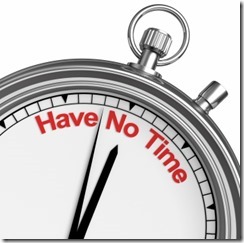Five Things To Do When Your Speech Gets Shortened
I recently received a question from John Kelley, a novelist whose debut book The Fallen Snow has gotten terrific reviews. He asks: “What does one do if a speaking engagement is shortened, perhaps dramatically, at the last minute?”
There’s little more disheartening than planning and practicing a presentation only to have your boss or a meeting organizer tell you at the last minute you need to chop it in half.
A few years ago, I experienced that firsthand. I was the third of three speakers scheduled to speak during a 50-minute conference breakout session. The previous two speakers both went long, and as I sat awaiting my turn, I watched helplessly as the minutes ticked away. What was supposed to be my twenty-minute section was quickly reduced to eight minutes.
Although it may be painful to have your talk cut at the last minute, it may offer you an advantage, too.
In my case, the two previous speakers had overstayed their welcome just a bit. My eight minutes, in contrast, went by quickly, so my talk came across to the audience as a content-packed burst of energy. As a result, I left my audience wanting more, always a more enviable position than staying too long and wearing them down.
So the first piece of advice I have for John is to remember that sometimes a shortened session can work in your favor. More tactically, though, here are five additional things to keep in mind:
1. Identify The “One Thing”
Before your talk, you should make a plan in case your time gets shortened. One easy way to do that is to identify the “one thing” you absolutely want the audience to know, even if your hour-long talk is shortened to five minutes. You should also think through various scenarios in advance (e.g. what to cut if you lose 15 or 30 minutes).
2. Don’t Rush
It’s a natural instinct: You have a lot of content but less time than you expected, so you increase your pace to make everything fit. It’s a bad idea. Your goal is still to share valuable information with the audience, and you’ll have a tougher time doing that if you don’t speak at a deliberate pace, with pauses, that allow audience members to absorb your information. Plus, your effectiveness will be hampered by a stressed, harried delivery.
3. Drop A Main Point, Not The Examples
Let’s say you want to make three main points during your talk. Some speakers facing a time crunch still opt to make their three points—but in order to make room, they cut all of their examples, case studies, anecdotes, and audience interactions (you know, the interesting stuff). It’s far better to lose a main point or two and supplement the one(s) that remain with the supporting content that makes them interesting.
4. Don’t Announce The Time Cut To Your Audience
Doing so screams “amateur!” and unnecessarily calls out the host, moderator, and/or other speakers. Just exhibit your grace under pressure, and the audience will probably notice.
5. Direct Them To Additional Resources
You may be able to direct the audience to information you weren’t able to cover in your shortened talk. Mention where they can find additional resources. In John’s case, let’s say he had been planning to read two sections of his novel during a book reading. He could say: “I’m only going to read one section today. But if you decide to read the book, I suggest you pay special attention to pages 152-159. You’ll see on those pages that I gave you more information about the main character’s childhood. I did that deliberately there, because…”
Hope that helps, John (and everyone else)! Thanks for reading the blog.
Don’t miss a thing! Click here to instantly join our mailing list and receive our most popular posts.





Thank you, Brad! You offer great advice, as always.
I’ve mentioned this before, but your tips on presenting ideas and staying focused – and out of trouble – while communicating go far beyond media situations (though they help tremendously in that arena). I’m constantly struck by how many of your posts are applicable to everyday situations, revealing the art of expressing oneself in any number of situations both at work and in personal life. I’ve recommended your blog to many folks who may never give a media interview for just that reason.
I’ll leave you tonight with a teaser. Waiting until I see (or rather hear) the results, but I think I may be able to share a success story with you in the coming days, one that would mark a clear professional milestone. Fingers crossed, and I’ll let you know soon.
Have a good evening, Brad. And thanks again for all that you do to help us all express ourselves a bit better.
John,
Thank you so much for those nice words. One of the greatest surprises in my career has been that the lessons from media training have many other applications to everyday communications.
It sounds like you recorded an important radio interview — if so, I wish you luck! I hope you nailed it and look forward to hearing it.
Happy holidays. Talk soon, I hope.
Brad